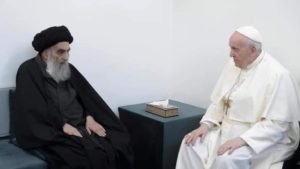His Holiness Pope Francis Meets Ayatullah Sayyid al-Sistani

Pope Francis meets Sayyid al-Sistani in Najaf (scroll down for more)
This morning, Saturday March 6, 2021, the Supreme Religious Authority, Sayyid Ali al-Husseini al-Sistani, hosted His Holiness Pope Francis during an exceptional gathering, which was filled with love, affection, and hope.
In an unprecedented gesture, His Eminence the Grand Ayatullah received his special guest at the entrance and personally welcomed the Pope warmly and those accompanying him to sit near him in his modest office. The virtuous scene was full of spirituality and optimism. The meeting comes after a long line of successive delegations between religious scholars of Najaf and the Vatican, all of which have culminated in this historic event.
The importance of the summit meeting between Pope Francis and Sayyid al-Sistani is not solely due to the many commonalities between Christianity and Islam, particularly Catholicism and Shi’ism, but rather from the similarities of these two spiritual leaders themselves, and from the embodiment of the lofty values and principles that they adhere to. Father Jorge Mario Bergoglio, the head of Christianity today, adopted the name of Francis of Assisi when he became the Pope. This was in emulation of the latter’s concern for the poor and vulnerable, and as a supreme gesture towards peace, and who holds a position like Peter, the successor of Jesus, who is buried in the Vatican. As such, the Pope’s position in Christianity is often compared to the place of Sayyid al-Sistani, who is the head of Muslims today and based near the shrine of Imam Ali (p), the successor of Prophet Muhammad (PBUH&HP), in the city of Najaf where the Islamic seminary (hawzah) has been for over a thousand years.
The Pope’s noble visit to Iraq is to the land of Prophet Abraham (p), the place of numerous civilizations, the home of Chaldeans and Assyrians, the land of Imam Ali and Imam Hussain (p). It is a visit to promote peace and refute terrorism, and a strong appreciation of the position of the religious authority and a recognition of its religious decree that defeated ISIS and liberated many cities and their innocent inhabitants, especially minorities, and welcomed and gave refuge to those who were displaced in Najaf and Karbala, and eventually helped them return to their homes. It is a declaration that still more needs to be done to reconstruct the region and ensure stability.
The two worldwide spiritual leaders provided crucial and impactful statements after forty-five minutes of discussion. According to the official statements issued by Najaf and the Vatican offices, His Eminence Sayyid al-Sistani spoke about the injustice, oppression, poverty, religious and intellectual persecution, suppression of basic freedoms and lack of social justice suffered by many people in different countries. This is particularly true in that region where wars, acts of violence, economic blockade, and displacement has caused so much suffering, especially for the Palestinian people in the occupied territories.
His Eminence pointed out the role that the great religious and spiritual leaders should play in ending these tragedies, and what is required to urge the concerned entities, especially those with great powers, to let reason and wisdom prevail and cast-off the language of war and not indulge in self-interest at the expense of the right of people to live in freedom and dignity. His Eminence also stressed the importance of concerted efforts to establish the values of harmony, peaceful coexistence and human solidarity in all societies based on fostering rights and mutual respect among the followers of different religions and schools of thought.
His Eminence praised the status and glorious history of Iraq and the great qualities of its people, who are of various affiliations, and he expressed his hope that they would soon overcome their current ordeal. He also affirmed that Christian citizens should live like all Iraqi people in terms of having security, peace, and full constitutional rights. As such, His Eminence described part of the role the religious authority played in protecting Christian citizens and all those who had been wronged and hurt in the events of the past few years, especially during the period terrorists seized vast areas in several Iraqi provinces and committed heinous crimes. Finally, His Eminence wished the Supreme Pontiff, the followers of the Catholic Church and all people happiness and well-being, and thanked him for making the effort to travel to Najaf to make this visit.
In turn, “the Holy Father stressed the importance of cooperation and friendship between religious communities to contribute to the good of Iraq, the region and the entire human family” through the cultivation of mutual respect and dialogue. The Pope “thanked Grand Ayatollah al-Sistani for speaking out, together with the Shia community, in defense of the most vulnerable and persecuted amid the violence and great hardships of recent years, and for affirming the sacredness of human life and the importance of the unity of the Iraqi people.” The Pope completed his visit with success and a sign of hope for the peace of humanity and restoration of tolerance and understanding. Moreover, shortly thereafter, the Prime Minister of Iraq announced that March 6 will be a day of tolerance in Iraq in honor of this momentous meeting and its significance to all people.
The Imam Mahdi Association of Marjaeya, (I.M.A.M.), the Liaison Office of the Religious Authority Grand Ayatullah Sayyid Ali al-Sistani in North America, derives inspiration from this exceptional summit and reaffirms its close and fraternal relations with Catholics and other religions and sects, reenergized with the strength and determination to proceed with its activities in interfaith dialogue and engagement for the sake of mankind, preservation of homelands, and for a prosperous future with justice, peace and love.
To read official statements from the Office of Sayyid al-Sistani and the Vatican, see the links below.
https://www.sistani.org/arabic/statement/26506/
I.M.A.M.
(This video has no sound)

Leave a Comment:
You must be logged in to post a comment.